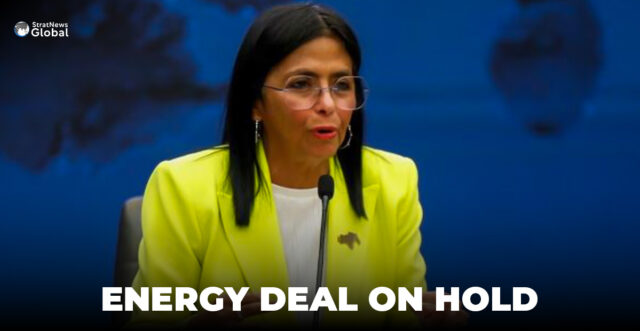Venezuelan President Nicolas Maduro announced on Monday that his government has suspended all energy agreements with Trinidad and Tobago, halting joint development initiatives and natural gas projects that had been underway between the two countries.
Maduro said in a TV broadcast that the oil ministry and state-run oil producer PDVSA’s board sent a proposal to suspend a cooperation agreement with Trinidad to his desk.
“I have approved the measure,” Maduro said.
His order immediately suspended all aspects of the energy agreement with Trinidad and Tobago, he said, and Congress and the Supreme Court will be asked to weigh in with additional recommendations.
That would likely mean Venezuela would revoke the license to develop the massive Dragon natural gas field, among other projects.
Pro-U.S. Stance Of Trinidad
Maduro criticized what he described as the pro-U.S. stance of Trinidad Prime Minister Kamla Persad-Bissessar, who took office on May 1.
Her government has had a close relationship with the administration of U.S. President Donald Trump, while tensions between Washington and Caracas have escalated.
Maduro, who has claimed the U.S. wants to drive him from power, said Persad-Bissessar threatened “to turn Trinidad and Tobago into the U.S. empire’s aircraft carrier against Venezuela.”
On Sunday, a U.S. warship docked in Trinidad, two days after the U.S. announced the deployment of an aircraft carrier group to Latin America.
As Trinidad faced declining gas reserves and production, former Trinidad prime minister Keith Rowley favoured energy diplomacy with Venezuela and resisted U.S. sanctions pressure.
Those efforts centered on the delayed Dragon natural gas field in Venezuelan waters near Trinidad. Its 4.2 trillion cubic feet of reserves could be a lifeline for Trinidad’s energy-dependent economy.
Rowley lost an election this year to Persad-Bissessar.
Shell and the National Gas Company of Trinidad received a renewed U.S. license earlier this month for the project.
Persad-Bissessar said her country did not need Venezuela’s gas.
“We have our plans to grow our economy both within the energy and non-energy sectors,” she told the Trinidad and Tobago Newsday newspaper.
Shell, NGC and BP, which are involved in various projects that include Venezuela, did not immediately reply to requests for comment.
Shell is separately developing the Manatee gas project, which crosses the maritime border into Venezuela but has received permission from the Maduro government to be developed on the Trinidad side independently. It was not immediately clear if that project could also be at risk.
(With inputs from Reuters)





